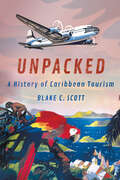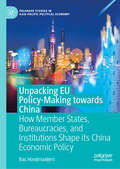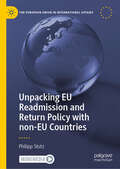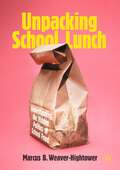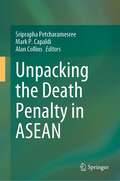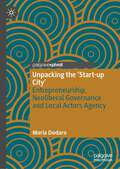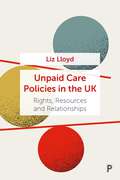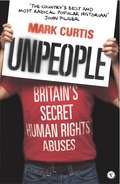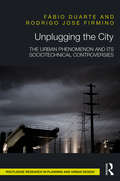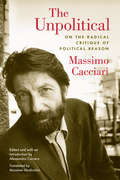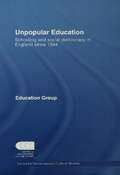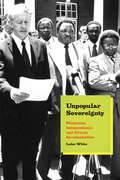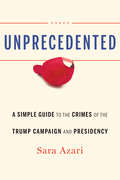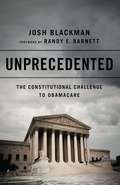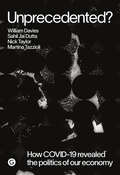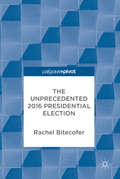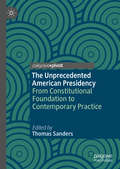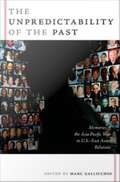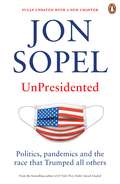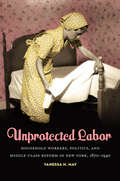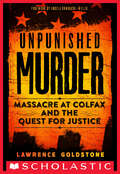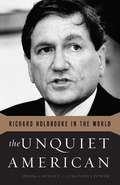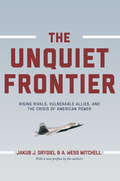- Table View
- List View
Unpacked: A History of Caribbean Tourism (Histories and Cultures of Tourism)
by Blake C. ScottUnpacked offers a critical, novel perspective on the Caribbean's now taken-for-granted desirability as a tourist's paradise. Dreams of a tropical vacation have become a quintessential aspect of the modern Caribbean, as millions of tourists travel to the region and spend extravagantly to pursue vacation fantasies. At the beginning of the twentieth century, however, travelers from North America and Europe thought of the Caribbean as diseased, dangerous, and, according to many observers, "the white man's graveyard." How then did a trip to the Caribbean become a supposedly fun and safe experience?Unpacked examines the historical roots of the region's tourism industry by following a well-traveled sea route linking the US East Coast with the island of Cuba and the Isthmus of Panama. Blake C. Scott describes how the cultural and material history of US imperialism became the heart of modern Caribbean tourism. In addition, he explores how advances in tropical medicine, perceptions of the tropical environment, and development of infrastructure and transportation networks opened a new playground for visitors.
Unpacking EU Policy-Making towards China: How Member States, Bureaucracies, and Institutions Shape its China Economic Policy (Palgrave Studies in Asia-Pacific Political Economy)
by Bas HooijmaaijersThis book examines different intellectual frameworks for international relations, including the bureaucratic politics model, neorealism, and institutionalism as tools for understanding the European Union’s (EU) China policy. Based on a study of three political economy-related cases, it demonstrates what approaches not just apply, but apply best in various stages of the policy cycle, why some models apply to several policy stages, and why some seem to work better than others in certain policy stages. The three cases include the EU-China solar panel dispute (2012–2018), the EU investigation into Chinese mobile telecommunications networks (2012–2014), and the EU’s response to China’s rise in Africa via the European Commission initiated EU-China-Africa trilateral cooperation initiative in 2008. Those interested in EU-China affairs can apply this innovative analytical framework to these three cases and a wide range of other issues; scholars, journalists, diplomats, and businesspeople will find this book of value.
Unpacking EU Readmission and Return Policy with non-EU Countries (The European Union in International Affairs)
by Philipp StutzThis book offers an in-depth exploration of the European Union's cooperation with non-EU countries on readmission and return, as central components of EU migration policy. It delves into the differences between formal and informal agreements and the factors influencing return rates, critically assessing the ‘effectiveness’ of cooperation in this contentious policy field. Through a comparative analysis of 57 non-EU countries, the book enhances our understanding of why certain countries cooperate on readmission and/or return. Countries geographically closer to the EU are more dependent and, thus, conclude readmission agreements more often. For countries in Africa and Asia, EU incentives and pressure play a bigger role and influence the cooperation together with domestic administrative capacities and bilateral readmission agreements and closer existing relations. Formal or informal readmission cooperation has a limited impact on return rates with non-EU countries beyond the Eastern neighbourhood. This comprehensive work is an essential reading for academics, policymakers, and policy advocates interested in EU external migration cooperation and the broader dynamics of international migration policy.
Unpacking School Lunch: Understanding the Hidden Politics of School Food
by Marcus B. Weaver-HightowerThis book delves into the heated political battles over what kids eat at school, shedding light onto how policymakers craft food policy for schools. The book takes readers inside schools, through the history of school food programs in the United States and England, and into the policy terrain that makes school lunch difficult to change. Through diverse case studies—hungry linebackers, pink slime, English reality television and policy making, pizza as a vegetable, lunch shaming, and more—chapters provide detailed analysis of rhetorical tactics, arguments over, and policy for school feeding. The book concludes with a progressive vision of school food that is healthy, pleasurable, educative, shame-free, and, most importantly, free for all students, just like the rest of school.
Unpacking the Death Penalty in ASEAN
by Sriprapha Petcharamesree Mark P. Capaldi Alan CollinsThis book contributes conceptually, theoretically and morally to a deeper understanding of the distinctive Asian perceptions of punishment, justice and human rights. Researched and prepared by scholars who have not only been conducting studies on the death penalty in the region but have also been advocating for legal reforms, this edited book touches upon the different justifications for the use of capital punishment in the ASEAN region, exposing the secrecy, sensitivities and dilemmas that mask violations of international human rights laws. The chapters bring in numerous new perspectives which have been overlooked in the traditional discourse surrounding the use of the death penalty, such as that around crimes that do not meet the threshold of “most serious”; the dignity of death row inmates and their families; contradictions within religion and capital punishment; and the way in which growing authoritarianism and the media are adversely influencing the public’s perception and support for capital punishment in the region. In examining how public opinion shapes state policies towards the death penalty and how it varies according to different offences and different states, the authors critically analyse how the international human rights mechanisms have specifically called for ASEAN member states to refrain from extending the application of the death penalty and to limit it to the “most serious crimes.” Relevant to socio-legal scholars focused on crime and punishment in Southeast Asia, and in the Global South more broadly, this is a landmark collection in criminology and human rights scholarship. Chapter "ASEAN and the Death Penalty: Theoretical and Legal Views and a Pathway to Abolition" is available open access under a Creative Commons Attribution 4.0 International License via link.springer.com.
Unpacking the ‘Start-up City’: Entrepreneurship, Neoliberal Governance and Local Actors Agency
by Maria DodaroThis book provides an invaluable overview of neoliberalising trends in urban policies and governance by presenting novel perspectives on municipal entrepreneurship support policies. It seeks to address a current lack of in-depth empirical knowledge of this topic and the reference literature’s silence on local actors agency. The book ’s scholarly debate around the impact of neoliberal capitalism on cities interweaves with empirical observations in the European cities of Barcelona and Milan with a view to examining what lies behind the “start-up city” label, and the way local actors reproduce, contest and re-signify entrepreneurship policies and practices in a highly individualised context. Based on more than sixty interviews with key policy actors, including young beneficiaries, it sheds light on their representations, motivations, intentions and room for manoeuvre in a way that encompasses local specificities in which multi-scalar economic, social, institutional and cultural processes interact. Finally, this book offers new insights into critical entrepreneurship studies and current debates about convergence and divergence trends in urban policies and governance.
Unpaid Care Policies in the UK: Rights, Resources and Relationships
by Liz LloydThis book examines policies on unpaid care throughout the UK since the 1990 NHS and Community Care Act. It questions why, after decades of policies and strategies, unpaid care remains in a marginal position in the social care system and in society more broadly, as demonstrated during the COVID-19 pandemic. It provides critical analysis of key policies and professional practice over three decades and highlights the continuing challenges faced by people in caring relationships, as well as reflecting on developments in the position of unpaid carers in the system of social care. By questioning why this crucially important sphere of human life remains under-resourced, it sheds light on the ways in which care is understood and how policy makers and service providers perceive the need for support.
Unpeople: Britain's Secret Human Rights Abuses
by Mark CurtisBritain is complicit in the deaths of ten million people. These are Unpeople - those whose lives are seen as expendable in the pursuit of Britain's economic and political goals.In Unpeople, Mark Curtis shows that the Blair government is deepening its support for many states promoting terrorism and, using evidence unearthed from formerly secret documents, reveals for the first time the hidden history of unethical British policies, including: support for the massacres in Iraq in 1963; the extraordinary private backing of the US in its aggression against Vietnam; support for the rise of Ugandan dictator Idi Amin; the running of a covert 'dirty war' in Yemen in the 1960s; secret campaigns with the US to overthrow the governments of Indonesia and British Guiana; the welcoming of General Pinochet's brutal coup in Chile in 1973; and much more. This explosive new book, from the author of Web of Deceit, exposes the reality of the Blair government's foreign policies since the invasion of Iraq. It discloses government documents showing that Britain's military is poised for a new phase of global intervention with the US, and reveals the extraordinary propaganda campaigns being mounted to obscure the reality of policies from the public.
Unplugging the City: The Urban Phenomenon and its Sociotechnical Controversies
by Fábio Duarte Rodrigo Jose FirminoModernity has entrusted technology with such power that it is treated as an autonomous entity, with its own manners and morals. Technological disruptions are also socially disruptive: technological failures reveal both the constituents of the technology itself and the social fabric woven by this technology. Cities are the quintessential technological arrangement, not only materially but also as a conceptual framework: the ubiquity of technology makes us think and plan cities mostly in terms of technological arrangements. Unplugging the City: The Urban Phenomenon and its Sociotechnical Controversies proposes a conceptual and methodological framework for analyzing certain urban phenomena as a technological assemblage. It demonstrates, through multiple case studies, the sociotechnical complexities involved in the stabilization and disruption of urban technological arrangements. Examples range from the urban phantasmagorias portrayed in science-fiction movies to the urban proposals of Brasilia and Masdar, from the book of bike-sharing systems to pervasive global surveillance systems. Written by Fábio Duarte and Rodrigo Firmino, based on their original research and publications, this is an essential resource for those interested in the theory and study of technology and its inextricable influence on the city.
The Unpolitical: On the Radical Critique of Political Reason
by Massimo CacciariMassimo Cacciari is one of the leading public intellectuals in today's Italy, both as an outstanding philosopher and political thinker and as now three times (and currently) the mayor of Venice. This collection of essays on political topics provides the best introduction in English to his thought to date. The political focus does not, however, prevent these essays from being an introduction to the full range of Cacciari's thought.The present collection includes chapters on Hofmannstahl, Lukács, Benjamin, Nietzsche, Weber, Derrida, Schmitt, Canetti, and Aeschylus. Written between 1978 and 2006, these essays engagingly address the most hidden tradition in European political thought: the Unpolitical. Far from being a refusal of politics, the Unpolitical represents a merciless critique of political reason and a way out of the now impracticable consolations of utopia and harmonious community. Drawing freely from philosophy and literature, The Unpolitical represents a powerful contribution to contemporary political theory.A lucid and engaging Introduction by Alessandro Carrera sets these essays in the context of Cacciari's work generally and in the broadest context of its historical and geographical backdrop.
Unpopular Education: Schooling and Social Democracy in England since 1944
by CccsPublished in the year 2006, Unpopular Education is a valuable contribution to the field of Media and Cultural Studies.
Unpopular Sovereignty: Rhodesian Independence and African Decolonization
by Luise WhiteIn 1965 the white minority government of Rhodesia (after 1980 Zimbabwe) issued a unilateral declaration of independence from Britain, rather than negotiate a transition to majority rule. In doing so, Rhodesia became the exception, if not anathema, to the policies and practices of the end of empire. In Unpopular Sovereignty, Luise White shows that the exception that was Rhodesian independence did not, in fact, make the state that different from new nations elsewhere in Africa: indeed, this history of Rhodesian political practices reveals some of the commonalities of mid-twentieth-century thinking about place and race and how much government should link the two. White locates Rhodesia’s independence in the era of decolonization in Africa, a time of great intellectual ferment in ideas about race, citizenship, and freedom. She shows that racists and reactionaries were just as concerned with questions of sovereignty and legitimacy as African nationalists were and took special care to design voter qualifications that could preserve their version of legal statecraft. Examining how the Rhodesian state managed its own governance and electoral politics, she casts an oblique and revealing light by which to rethink the narratives of decolonization.
Unprecedented: A Simple Guide to the Crimes of the Trump Campaign and Presidency
by Sara AzariThe Trump administration&’s attempted and actual violations of the Constitution and the law have surpassed our worst expectations again and again. Add to that the legal morass surrounding members of the Trump campaign staff, and the United States finds itself led by the most corrupt administration in modern American history. The investigation by Special Counsel Robert Mueller on 2016 election interference and obstruction of justice led to multiple indictments that boggle even the brightest legal minds. So how can the rest of us make sense of it all? Sara Azari breaks down the investigations, evidence, criminal charges, and defenses involving an ever-expanding rogues&’ gallery of Trump associates and campaign members, as well as the president&’s own criminal conduct. Her docket also includes a comprehensive summary and expert analysis of the Mueller Report. Azari addresses the consequences of President Trump&’s conduct and considers whether the president of the United States is ever above the law. An essential nonpartisan guide, Unprecedented gives readers the tools they need to understand the legal issues engulfing Trump&’s campaign and presidency.
Unprecedented: The Constitutional Challenge to Obamacare
by Randy E. Barnett Josh BlackmanIn 2012, the United States Supreme Court became the center of the political world. In a dramatic and unexpected 5-4 decision, Chief Justice John Roberts voted on narrow grounds to save the Affordable Care Act, commonly known as Obamacare. Unprecedented tells the inside story of how the challenge to Obamacare raced across all three branches of government, and narrowly avoided a constitutional collision between the Supreme Court and President Obama. <p><p> On November 13, 2009, a group of Federalist Society lawyers met in the Mayflower Hotel in Washington, D.C., to devise a legal challenge to the constitutionality of President Obama's "legacy" — his healthcare reform. It seemed a very long shot, and was dismissed peremptorily by the White House, much of Congress, most legal scholars, and all of the media. Two years later the fight to overturn the Affordable Care Act became a political and legal firestorm. When, finally, the Supreme Court announced its ruling, the judgment was so surprising that two cable news channels misreported it and announced that the Act had been declared unconstitutional. <p> Unprecedented offers unrivaled inside access to how key decisions were made in Washington, based on interviews with over one hundred of the people who lived this journey — including the academics who began the challenge, the attorneys who litigated the case at all levels, and Obama administration attorneys who successfully defended the law. It reads like a political thriller, provides the definitive account of how the Supreme Court almost struck down President Obama's "unprecedented" law, and explains what this decision means for the future of the Constitution, the limits on federal power, and the Supreme Court.
Unprecedented?: How COVID-19 Revealed the Politics of Our Economy (Goldsmiths Press / PERC Papers)
by William Davies Sahil Jai Dutta Nick Taylor Martina TazzioliA critical and evidence-based account of the COVID-19 pandemic as a political–economic rupture, exposing underlying power struggles and social injustices.The dawn of the COVID-19 pandemic represented an exceptional interruption in the routines of work, financial markets, movement across borders and education. The policies introduced in response were said to be unprecedented—but the distribution of risks and rewards was anything but. While asset-owners, outsourcers, platforms and those in spacious homes prospered, others faced new hardships and dangers. Unprecedented? explores the events of 2020-21, as they afflicted the UK economy, as a means to grasp the underlying dynamics of contemporary capitalism, which are too often obscured from view. It traces the political and cultural contours of a "rentier nationalism," that was lurking prior to the pandemic, but was accelerated and illuminated by COVID-19. But it also pinpoints the contradictions and weaknesses of this capitalist model, and the new sources of opposition that it meets. An empirical, accessible and critical analysis of the COVID economy, Unprecedented? is essential reading for anyone seeking to understand the political and economic turbulence of the pandemic&’s first eighteen months.
The Unprecedented 2016 Presidential Election
by Rachel BitecoferThis book explains the 2016 presidential election through a strategic focus. In the primaries both parties faced challenges from insurgent outsiders riding waves of populist fervor in the electorate, but only the Democrats were able to steer the nomination into the hands of their establishment favorite. Why weren't Republican elites able to stop Donald Trump from hijacking their party's nomination? Why did Hillary Clinton come up short on Election Day despite the fact that nearly everyone expected her to win after her opponent ran a haphazard campaign plagued by scandal after scandal? The research presented here argues that the Clinton campaign conducted the nearly perfect execution of the wrong electoral strategy, costing her the Electoral College and her chance to become America's first female president.
The Unprecedented American Presidency: From Constitutional Foundation to Contemporary Practice
by Thomas SandersThis Palgrave Pivot presents a comprehensive introduction along with four essays on the institution of the American presidency, reflecting on broad implications for American political culture and practice. Each by an eminent scholar of the presidency, these pieces provide a thorough understanding of the uniqueness of the executive office of government and its evolution, with special emphasis on twentieth and twenty-first century practices and challenges. Together, they help to shed light on the current political crisis, and explain the circumstances in which Donald Trump has come to occupy this central office of American democracy.
The Unpredictability of the Past: Memories of the Asia-Pacific War in U.S.-East Asian Relations
by Marc GallicchioIn The Unpredictability of the Past, an international group of historians examines how collective memories of the Asia-Pacific War continue to affect relations among China, Japan, and the United States. The contributors are primarily concerned with the history of international relations broadly conceived to encompass not only governments but also nongovernmental groups and organizations that influence the interactions of peoples across the Pacific. Taken together, the essays provide a rich, multifaceted analysis of how the dynamic interplay between past and present is manifest in policymaking, popular culture, public commemorations, and other arenas. The contributors interpret mass media sources, museum displays, monuments, film, and literature, as well as the archival sources traditionally used by historians. They explore how American ideas about Japanese history shaped U. S. occupation policy following Japan's surrender in 1945, and how memories of the Asia-Pacific War influenced Washington and Tokyo policymakers' reactions to the postwar rise of Soviet power. They investigate topics from the resurgence of Pearl Harbor images in the U. S. media in the decade before September 11, 2001, to the role of Chinese war museums both within China and in Chinese-Japanese relations, and from the controversy over the Smithsonian Institution's Enola Gay exhibit to Japanese tourists' reactions to the USS Arizona memorial at Pearl Harbor. One contributor traces how a narrative commemorating African Americans' military service during World War II eclipsed the history of their significant early-twentieth-century appreciation of Japan as an ally in the fight against white supremacy. Another looks at the growing recognition and acknowledgment in both the United States and Japan of the Chinese dimension of World War II. By focusing on how memories of the Asia-Pacific War have been contested, imposed, resisted, distorted, and revised, The Unpredictability of the Past demonstrates the crucial role that interpretations of the past play in the present. Contributors. Marc Gallicchio, Waldo Heinrichs, Haruo Iguchi, Xiaohua Ma, Frank Ninkovich, Emily S. Rosenberg, Takuya Sasaki, Yujin Yaguchi, Daqing Yang
UnPresidented: Politics, pandemics and the race that Trumped all others
by Jon SopelFear and loathing on the 2020 campaign trail...'26 February, White House Briefing RoomThe coronavirus feels like it is changing everything. Suddenly it's not just a public health emergency; it has the potential to upend this whole election...'In UnPresidented: Politics, pandemics and the race that Trumped all others, BBC North America Editor Jon Sopel presents a diary of an election like we've never quite seen before.Experience life as a reporter on the campaign trail, as the election heats up and a global pandemic slowly sweeps in. As American lives are lost at a devastating rate, the presidential race becomes a battle for the very soul of the nation - challenging not just the Trump presidency, but the very institutions of American democracy itself.In this highly personal account of reporting on America in 2020, Jon Sopel takes you behind the scenes of a White House in crisis and an election in turmoil, expertly laying bare the real story of the presidential campaign in a panoramic account of an election and a year like no other.
The Unprotected Class: How Anti-White Racism Is Tearing America Apart
by Jeremy CarlAnti-white racism, undisguised and unembarrassed, is now official policy in America.One class of citizens—whites—is openly discriminated against in every sphere of public and private life. The Unprotected Class is a comprehensive explanation of how we got here and what we must do to correct a manifest—and dangerous—injustice. Launched with an appeal to justice for all, the civil rights movement went off the rails even as it achieved its original goals. Soon its excesses and failures were exploited to justify discrimination against whites in business, education, law, entertainment, and even the church. With the death of George Floyd and the shedding of all pretense of racial justice, vindictiveness, resentment, and hatred were unleashed in America.
Unprotected Labor: Household Workers, Politics, and Middle-class Reform in New York, 1870-1940
by Vanessa H. MayThrough an analysis of women's reform, domestic worker activism, and cultural values attached to public and private space, Vanessa May explains how and why domestic workers, the largest category of working women before 1940, were excluded from labor protections that formed the foundation of the welfare state. Looking at the debate over domestic service from both sides of the class divide, Unprotected Labor assesses middle-class women's reform programs as well as household workers' efforts to determine their own working conditions. May argues that working-class women sought to define the middle-class home as a workplace even as employers and reformers regarded the home as private space. The result was that labor reformers left domestic workers out of labor protections that covered other women workers in New York between the late nineteenth century and the New Deal. By recovering the history of domestic workers as activists in the debate over labor legislation, May challenges depictions of domestics as passive workers and reformers as selfless advocates of working women. Unprotected Labor illuminates how the domestic-service debate turned the middle-class home inside out, making private problems public and bringing concerns like labor conflict and government regulation into the middle-class home.
Unpunished Murder: Massacre at Colfax and the Quest for Justice
by Lawrence GoldstoneHow the Supreme Court turned a blind eye on justice, stripped away the equal rights promised to all Americans, and ushered in the era of Jim Crow.On Easter Sunday of 1873, just eight years after the Civil War ended, a band of white supremacists marched into Grant Parish, Louisiana, and massacred over one hundred unarmed African Americans. The court case that followed reached the highest court in the land. Yet, following one of the most ghastly incidents of mass murder in American history, not one person was convicted.The opinion issued by the Supreme Court in US v. Cruikshank set in motion a process that would help create a society in which Black Americans were oppressed and denied basic human rights—legally, according to the courts. These injustices paved the way for Jim Crow and would last for the next hundred years. Many continue to exist to this day.In this compelling and thoroughly researched volume for young readers, Lawrence Goldstone traces the evolution of the law and the fascinating characters involved in the story of how the Supreme Court helped institutionalize racism in the American justice system.“Spotlighting an event seldom discussed in books for young people, Goldstone provides a complex, useful historical context for understanding issues surrounding race and justice.” —Booklist (starred review)“A unique look at not only the massacre in question, but also at the history and workings of the Supreme Court of the United States.” —School Library Connection“The book is, in large part, the story of how racism evolves, persisting in laws and politics despite major social advances.” —The Horn Book (starred review)
The Unquiet American: Richard Holbrooke in the World
by Samantha Power Derek CholletRichard Holbrooke, who died in December 2010, was a pivotal player in U. S. diplomacy for more than forty years. Most recently special envoy for Iraq and Afghanistan under President Obama, Holbrooke also served as assistant secretary of state for both Asia and Europe, and as ambassador to both Germany and the United Nations. He had a key role in brokering a peace agreement among warring factions in Bosnia that led to the Dayton Peace Accords in 1995. Widely regarded to possess one of the most penetrating minds of any modern diplomat of any nation, Holbrooke was also well known for his outsized personality, and his capacity to charm and offend in equally colossal measures. In this book, the friends and colleagues who knew him best survey his accomplishments as a diplomat, activist, and author. Excerpts from HolbrookeOCOs own writings further illuminate each significant period of his career. "The Unquiet American" is both a tribute to an exceptional public servant and a backstage history of the last half-century of American foreign policy.
The Unquiet Frontier
by Jakub J. Grygiel A. Wess MitchellFrom the Baltic to the South China Sea, newly assertive authoritarian states sense an opportunity to resurrect old empires or build new ones at America's expense. Hoping that U.S. decline is real, nations such as Russia, Iran, and China are testing Washington's resolve by targeting vulnerable allies at the frontiers of American power. The Unquiet Frontier explains why the United States needs a new grand strategy that uses strong frontier alliance networks to raise the costs of military aggression in the new century.Jakub Grygiel and Wess Mitchell describe the aggressive methods rival nations are using to test U.S. power in strategically critical regions throughout the world. They show how rising and revisionist powers are putting pressure on our frontier allies--countries like Poland, Israel, and Taiwan--to gauge our leaders' commitment to upholding the U.S.-led global order. To cope with these dangerous dynamics, nervous U.S. allies are diversifying their national-security "menu cards" by beefing up their militaries or even aligning with their aggressors. Grygiel and Mitchell reveal how numerous would-be great powers use an arsenal of asymmetric techniques to probe and sift American strength across several regions simultaneously, and how rivals and allies alike are learning from America's management of increasingly interlinked global crises to hone effective strategies of their own.The Unquiet Frontier demonstrates why the United States must strengthen the international order that has provided greater benefits to the world than any in history.
The Unquiet Frontier: Rising Rivals, Vulnerable Allies, and the Crisis of American Power
by A. Wess Mitchell Jakub J. GrygielFrom the Baltic to the South China Sea, newly assertive authoritarian states sense an opportunity to resurrect old empires or build new ones at America's expense. Hoping that U.S. decline is real, nations such as Russia, Iran, and China are testing Washington's resolve by targeting vulnerable allies at the frontiers of American power. The Unquiet Frontier explains why the United States needs a new grand strategy that uses strong frontier alliance networks to raise the costs of military aggression in the new century.Jakub Grygiel and Wess Mitchell describe the aggressive methods rival nations are using to test U.S. power in strategically critical regions throughout the world. They show how rising and revisionist powers are putting pressure on our frontier allies—countries like Poland, Israel, and Taiwan—to gauge our leaders' commitment to upholding the U.S.-led global order. To cope with these dangerous dynamics, nervous U.S. allies are diversifying their national-security "menu cards" by beefing up their militaries or even aligning with their aggressors. Grygiel and Mitchell reveal how numerous would-be great powers use an arsenal of asymmetric techniques to probe and sift American strength across several regions simultaneously, and how rivals and allies alike are learning from America's management of increasingly interlinked global crises to hone effective strategies of their own.The Unquiet Frontier demonstrates why the United States must strengthen the international order that has provided greater benefits to the world than any in history.
